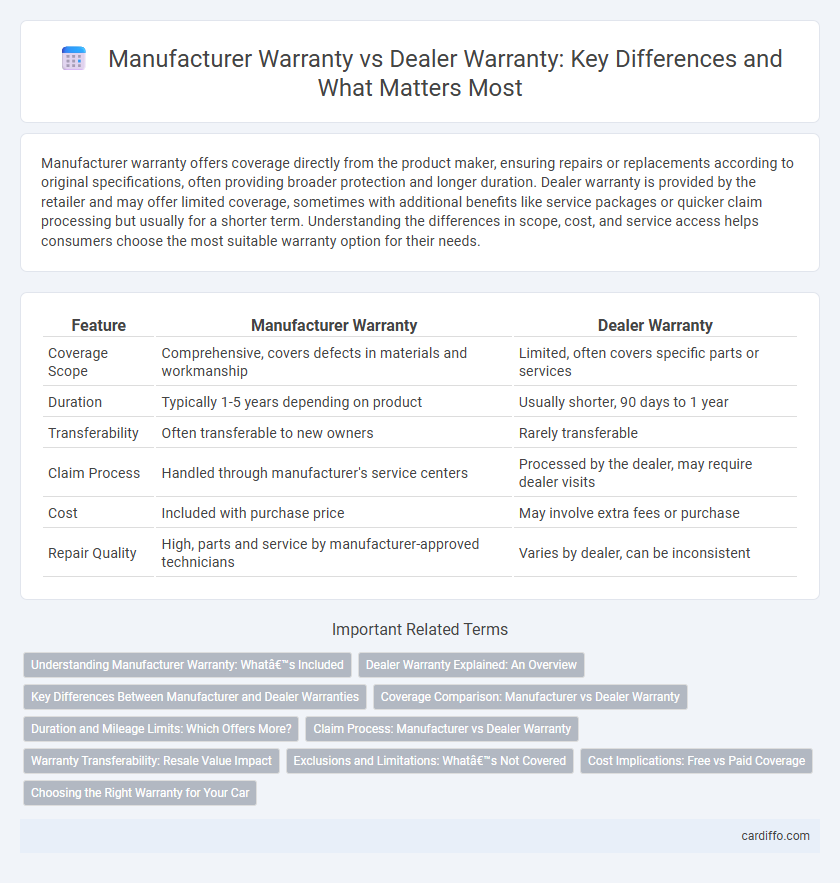Manufacturer warranty offers coverage directly from the product maker, ensuring repairs or replacements according to original specifications, often providing broader protection and longer duration. Dealer warranty is provided by the retailer and may offer limited coverage, sometimes with additional benefits like service packages or quicker claim processing but usually for a shorter term. Understanding the differences in scope, cost, and service access helps consumers choose the most suitable warranty option for their needs.
Table of Comparison
| Feature | Manufacturer Warranty | Dealer Warranty |
|---|---|---|
| Coverage Scope | Comprehensive, covers defects in materials and workmanship | Limited, often covers specific parts or services |
| Duration | Typically 1-5 years depending on product | Usually shorter, 90 days to 1 year |
| Transferability | Often transferable to new owners | Rarely transferable |
| Claim Process | Handled through manufacturer's service centers | Processed by the dealer, may require dealer visits |
| Cost | Included with purchase price | May involve extra fees or purchase |
| Repair Quality | High, parts and service by manufacturer-approved technicians | Varies by dealer, can be inconsistent |
Understanding Manufacturer Warranty: What’s Included
Manufacturer warranty typically covers defects in materials and workmanship for a set period or mileage, providing comprehensive protection directly from the vehicle maker. It often includes powertrain, bumper-to-bumper, corrosion, and emissions components, ensuring repairs and replacements meet factory standards. Understanding these inclusions helps buyers distinguish between manufacturer warranties and dealer warranties, which may offer more limited or customized coverage.
Dealer Warranty Explained: An Overview
Dealer warranty refers to the coverage provided directly by the dealership, often supplementing or extending the manufacturer warranty, with varying terms and conditions specific to the dealer. This warranty typically covers repairs and services handled at the dealer's discretion, sometimes offering more flexible options but limited geographical coverage compared to manufacturer warranties. Understanding dealer warranty details, including duration, coverage scope, and claim procedures, is crucial for consumers seeking comprehensive post-purchase protection.
Key Differences Between Manufacturer and Dealer Warranties
Manufacturer warranties typically cover defects and repairs for a specified period directly from the vehicle maker, ensuring standardized coverage and nationwide service. Dealer warranties often provide additional or extended coverage tailored by the dealership, potentially including extra perks like free maintenance or service incentives. Key differences include the source of coverage, duration, scope of protection, and regional service limitations, making it essential to compare terms carefully.
Coverage Comparison: Manufacturer vs Dealer Warranty
Manufacturer warranties typically offer comprehensive coverage that includes repairs for defects in materials and workmanship, often spanning longer durations and miles. Dealer warranties may provide more limited coverage, focusing on specific components or shorter timeframes, and sometimes include additional perks like service incentives or flexible terms. Comparing these warranties, manufacturer plans often ensure broader protection, while dealer warranties can offer customized options tailored to buyer preferences.
Duration and Mileage Limits: Which Offers More?
Manufacturer warranties typically offer longer coverage periods, often ranging from 3 to 7 years with mileage limits between 36,000 and 100,000 miles, providing extensive protection against defects. Dealer warranties usually have shorter durations, commonly 1 to 3 years, with more restrictive mileage caps, sometimes under 36,000 miles, reflecting limited coverage scope. Evaluating duration and mileage limits clearly indicates that manufacturer warranties generally deliver more comprehensive and longer-lasting coverage compared to dealer warranties.
Claim Process: Manufacturer vs Dealer Warranty
The claim process for a manufacturer warranty typically involves contacting the automaker's authorized service centers, where repairs are performed using genuine parts and covered under specific terms outlined by the manufacturer. Dealer warranties often require claims to be processed directly through the dealership, which can vary in service quality and may include shorter coverage periods or limited repair options compared to manufacturer warranties. Understanding the distinct procedures and coverage limitations of manufacturer versus dealer warranties is crucial to ensuring efficient claim approvals and minimized out-of-pocket expenses.
Warranty Transferability: Resale Value Impact
Manufacturer warranties typically offer transferability to subsequent owners, enhancing the vehicle's resale value by providing ongoing coverage reassurance. Dealer warranties may have limited or no transfer options, which can reduce buyer confidence and lower resale prices. Transferable warranties from manufacturers are often viewed as a significant benefit during vehicle resale negotiations.
Exclusions and Limitations: What’s Not Covered
Manufacturer warranties typically exclude coverage for routine maintenance, wear and tear, and damage caused by misuse or accidents, setting strict limitations on parts replaced by unauthorized service providers. Dealer warranties often have narrower scopes, frequently excluding pre-existing conditions, cosmetic defects, and coverage may be voided if repairs are performed outside the dealership. Understanding these exclusions is crucial for consumers to avoid unexpected expenses and ensure proper protection under each warranty type.
Cost Implications: Free vs Paid Coverage
Manufacturer warranties typically offer free coverage for a specified period or mileage, covering repairs and defects without additional costs to the buyer. Dealer warranties, often paid services, can vary widely in price and may extend coverage beyond the manufacturer's terms, but usually come with deductibles or service fees. Understanding the cost implications between no-cost manufacturer warranties and potentially costly dealer warranties is crucial for informed vehicle ownership decisions.
Choosing the Right Warranty for Your Car
Manufacturer warranties typically offer comprehensive coverage backed by the car maker, including powertrain, bumper-to-bumper, and corrosion protection, ensuring standardized service nationwide. Dealer warranties often provide flexible, customizable plans with added benefits such as extended roadside assistance or service perks, tailored to the local market and specific customer needs. Evaluating the scope, duration, and included services of each warranty type helps car buyers make informed decisions that maximize vehicle protection and value.
Manufacturer Warranty vs Dealer Warranty Infographic

 cardiffo.com
cardiffo.com